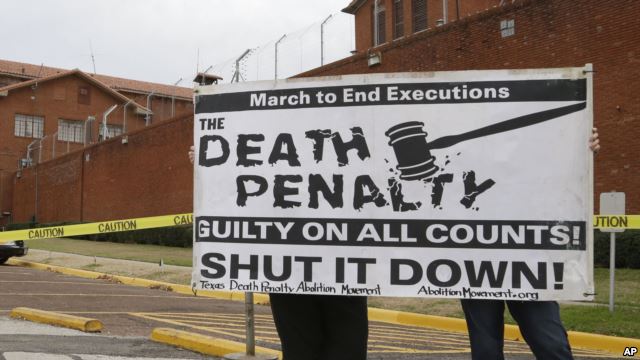VOA慢速英语:美国支持死刑的呼声高
In US, Support for Death Penalty Is Strong
By Christopher Cruise
16 December, 2014
Most industrialized nations have stopped executing criminals. But the death penalty is still legal in many parts of the United States.
Public opinion studies show that support for the death penalty among Americans is lower than it once was. But it remains strong -- at around 60 percent. However, the same surveys show that even death penalty supporters have concerns about the justice system and the way executions are carried out.
 |
|
Death penalty opponents stand outside the prison Jan. 22, 2014, in Huntsville, Texas. (AP Photo/Pat Sullivan) |
When people are put to death in the prison in Huntsville, Texas, death penalty opponents often demonstrate outside the building.
"Today, around the state, people are gathered to say 'No!' to the death penalty."
Texas carries out more executions than any other state. Last year, it put 16 people to death. Surveys show most people in Texas support the death penalty.
Dudley Sharp is among those supporters. He says executions ensure that killers do not kill again, and persuade others not to kill.
"The evidence that the death penalty deters no one doesn't exist. The evidence that the death penalty deters some people is overwhelming."
He says most family members of murder victims support the death penalty. But he says they do not celebrate when someone is put to death.
"All of this is in the context of losing an innocent life to an unjust murder, and so, you know, none of it's good."
Pat Monks is a lawyer in Houston, Texas. He opposes the death penalty and criticizes the justice system that imposes it.
"It assumes that this system is perfect in one instance, maybe in one instance, and, you know, it's not."
Pat Monks notes that, in some cases, new evidence has led to the release of prisoners who have been sentenced to death. He says the death penalty, also known as "capital punishment," is an ancient custom that Americans took from another country that no longer uses it.
"It is from England, the common-law system in which the king owns all of us, and we are all subject to the king."
In early December, an appeals court ordered a stay, or stoppage, in the planned execution of Scott Panetti. He had been found guilty of murder. Doctors say he suffers from the mental disorder schizophrenia.
Kathryn Kase of the Texas Defenders Service serves as his lawyer. She is pleased that his case is getting nationwide attention.
"What we see in the stay is this emerging awareness in the United States that we don't want to execute people with serious mental illness."
The state of Texas says Scott Panetti understands the court case against him and his death sentence. But Ms. Kase disagrees. And she says executing a person with a severe mental illness does not serve the purpose that most people expect from the death penalty.
"We are supposed to be reserving the death penalty for the worst of the worst. The problem is when we get into choosing who that is, you know, we're not consistent."
Surveys show that younger Americans support life jail sentences for murderers more than they support the death penalty. And less than half of those asked support executing people who are mentally ill.
I'm Christopher Cruise.
VOA Correspondent Greg Flakus reported this story from Houston. Christopher Cruise wrote it for VOA Learning English. George Grow was the editor.
______________________________________________________________
Words in This Story
death penalty – n. death as a punishment given by a court of law for very serious crimes
ensure – v. to make (something) sure, certain, or safe
deter – v. to cause (someone) to decide not to do something
overwhelming – adj. very great in number, effect, or force
context – n. the situation in which something happens; the group of conditions that exist where and when something happens
impose – v. to cause (something, such as a tax, fine, rule, or punishment) to affect someone or something by using your authority
assume – v. to think that something is true or probably true without knowing that it is true
instance – n. an example of a particular type of action or situation; an occasion of something happening
capital punishment – n. punishment by death; the practice of killing people as punishment for serious crimes
schizophrenia – n. a very serious mental illness in which someone cannot think or behave normally and often experiences delusions
emerging – adj. newly-created or -noticed and growing in strength or popularity; becoming widely-known or established
awareness – adj. a feeling, experiencing, or noticing of something (such as a sound, sensation, or emotion)
reserve – v. to have or keep (something, such as a right) for possible use at a future time
consistent – adj. continuing to happen or develop in the same way
What is your opinion of the death penalty? Is it used in your country? If so, how often is it carried out and how are people put to death? Write your thoughts in the comments section. We want to hear from you.
- 频道推荐
- |
- 全站推荐
- 推荐下载
- 网站推荐




















